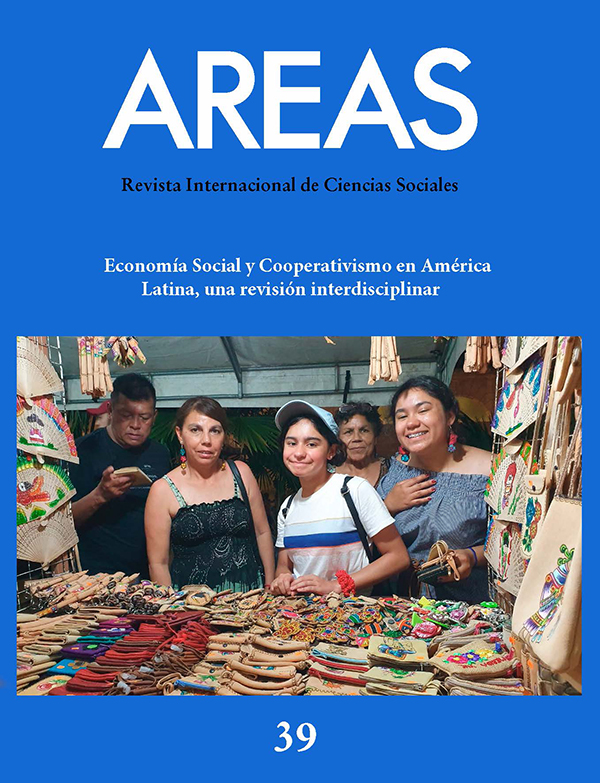Would the World Be Better Without Money? Notes from History, Anthropology and Political Economy about Markets and Alternative Currencies
Abstract
The present article aims to answer the question of what to do so that alternative currencies go outside the paradigm of national currency currencies, what is really being questioned is how to make the currency disruptive to the dominant economic system, the capitalist economy; to be able to respond, we bring notes from economic anthropology, history and political economy on the market and currencies to find their foundation and thereby make visible what are the guidelines for these spaces can be disputed and take them to a logic of reproduction of life. You can find within the present text that markets have historically been peripheral to economic human activity and that reproductive logics are based on reciprocal and redistributive relationships of a non-commercial nature, however, we maintain that the constitution of markets and currencies is a first step within the construction of other economies.
Downloads
-
Abstract2219
-
pdf (Español (España))842
References
ÁLVAREZ, J. (2012): “La economía comunitaria de reciprocidad en el nuevo contexto de la Economía Social y Solidaria: Una mirada desde Bolivia”. Otra economía. Revista latinoamericana de economía social solidaria, 6 (11), pp. 159-170.
COLLIN, L. (2007): “Experiencias en torno al dinero alternativo, fortalezas y debilidades”, Revista Pasos, 132, pp. 11-22.
CRUZ, A. (2011): “La acumulación solidaria. Los desafíos de la economía asociativa bajo la mundialización del capital”, en III Congresso da rede de ITCPS e I simpósio internacional de extensão universitária e economia solidária, Porto Alegre, Brasil.
DUSSEL, E. (2014): 16 tesis de economía política. Una interpretación filosófica. México D.F., Siglo XXI.
DUSSEL, E. (2016): 14 tesis de ética. Hacia la esencia del pensamiento crítico. Ciudad de México, Editorial Trotta.
ECHEVERRÍA, B. (2017 [1986]): El discurso crítico de Marx. Ciudad de México, FCE/ITACA.
ECHEVERRÍA, B. (2005) “Renta Tecnológica y Capitalismo Histórico”, Mundo Siglo XXI, 2, pp. 17-20.
GARCÍA, A. (2015 [1994]): Forma valor y forma comunidad. Quito, IAEN/Traficantes de sueños.
GUTIÉRREZ, R. (2009): Los ritmos de Pachakuti. Levantamiento y movilización en Bolivia (2000-2005). México D.F., Bajo Tierra Ed./BUAP.
GUTIÉRREZ R. y SALAZAR H. (2015): “Reproducción comunitaria de la vida. Pensando en la trans-formación en el presente”. El Apantle. Revista de Estudios Comunitarios, 1, pp. 15-50
HERNANDO, A. (2018): La fantasía de la individualidad. Sobre la construcción sociohistórica del sujeto moderno. Madrid, Traficantes de sueños.
HINKELAMMERT, F. y MORA, H. (2013): Una economía para la vida. Preludio a una segunda crítica de la economía política. Morelia, UMSNH.
POLANYI, K. (2015 [1957]): La gran transformación. Los orígenes políticos y económicos de nuestro tiempo. México DF, FCE.
SABOURIN, E. (2011): “Teoria da reciprocidade e sócio-antropologia do desenvolvimento”. Sociologias. 27, pp. 24-51.
SEMO, E. (2006): Historia económica de México. Vol. 01: los orígenes, de los cazadores y recolectoras a las sociedades tributarias (22,000 a. C. - 1519 d. C.). México D.F., UNAM/Océano.
WOLF, E. (2001 [1998]): Figurar el poder. Ideologías de dominación y crisis. México D.F., CIESAS.
VILLORO, L. (2010 [1992]): El pensamiento moderno. Filosofía del renacimiento. México D.F, Fondo de Cultura Económica.
The published works by this Journal are subject to the following terms:
1. The Publication Service of the University of Murcia (the Editor) owns the copyright of its publications. It promotes and allows its use under the indicated licence in Section 2.
© Servicio de Publicaciones, Universidad de Murcia, 2011
2. Papers are digitally published under the licence Creative Commons Reconocimiento-NoComercial-SinObraDerivada 3.0 España (legal text). They can be copied, used, disseminated, transferred and publically presented if: i) the author is quoted, as well as the original source of publication (Journal, editorial and URL); ii) they are not used for commercial purposes; iii) the licence of use is mentioned.
3. Auto-file Conditions. It is allowed and authors are encouraged to digitally disseminate their pre-print versions (versions prior to review) and/or post-print (reviewed version accepted for its publication) since it promotes its early diffusion and the corresponding increase of quotes and scope within the academic community. RoMEO Colour: green.


